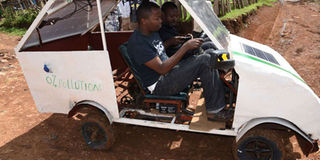Climate change reality pushes man to make solar car

Karumbo drives his solar-powered car in Langas, Uasin Gishu County, on May 31, 2018. PHOTO | JARED NYATAYA | NATION MEDIA GROUP
What you need to know:
- Karumbo wants to use the car to create awareness and reach out to people to adopt clean energy to protect the environment.
- A resident asked the government to support Mr Karumbo so that he motivates other youth to emulate him and earn a livelihood through the innovation.
Many motorists grapple with high cost of fuel every day, with a litre of petrol currently going for Sh106.30.
But an innovator from Langas, Uasin Gishu County, is eager to end motorists’ agony at the pump after coming up with a solar-powered car.
Samuel Karumbo’s vehicle uses only solar to run and can also charge mobile phones and provide home lighting.
Karumbo holds a Diploma in Electrical Installation from the Kitale National Polytechnic.
ECO-FRIENDLY
He has named his prototype “Kenya One Solar Car”. He has been working on the invention for four months and hopes to showcase it next year at the annual Eldoret ASK Show.
The car can carry two people and Karumbo says that he plans to commercialise the machine and make it available to the local market if well supported.
When the Nation visited him at his small garage tucked in the heart of the vast Langas slum, about 7km from Eldoret Town, Karumbo was busy doing the final touches on the machine he says he has been working on and improving for months.
“I have wished to own a cost-effective car that is eco-friendly for many years because across the world, countries are fast embracing green energy,” Karumbo says.
SOLAR ENERGY
He started making the vehicle in his compound that he has converted into a workshop by piecing together scrap metal.
“This car does not require fuel, all it needs to move is solar energy. In fact, it is so unique that I am planning to start showcasing it at exhibitions,” a confident Karumbo says.
The car has one large solar panel at the rear, another on top and a small one in front that is used for lighting.
“The panels collect the solar energy before it is converted into electronic energy. The new energy is stored in batteries that drive the four wheels.”
He says the vehicle can successfully cover about 100km in a day and weighs approximately 120kg.
GREEN ENERGY
Edward Moenga, an environmental expert, says "using a solar-powered car is cheaper because solar energy is free. It is also environmental friendly".
The solar panels have a total of 260 watts, which is a lot of energy, according to Karumbo.
Mr Karumbo says that he wants to use the car to create awareness and reach out to people to adopt clean energy to protect the environment.
Apart from the solar-powered car, Mr Karumbo - who also holds a diploma certificate in business management - has also invented a cooking system driven by a cell phone. He has named it “robot’.
When Karumbo dials the cell phone, it initiates the cooking of the food that he will have placed on the electronic cooker in advance. The device is also able to switch on security lights.
Other innovations include an energy generating bed and a feeding machine that can help people living with disabilities.
HOPE
But it is the solar-powered car that has sent a wave of excitement among the residents.
The vehicle usually draws a huge crowd of onlookers who move around it as it navigates through the roads in the slum.
“This innovation has awakened some sense of pride in the residents of Langas slum who for a very long have been associated with crime among other evil deeds,” Mzee Patrick Wafula, a resident of Kona Mbaya area in Langas, says.
Another resident, Ms Susan Atieno, asked both the national and county governments to support Mr Karumbo so that he motivates other youth to emulate him and earn a livelihood through the innovation.
“If the national government or the county were to come on board and support this young man then he would in turn have the necessary resources to employ his fellow youth to help him manufacture such cars and sell them to Kenyans at affordable prices,” Ms Atieno says.
SUPPORT
Mr Karumbo noted that the whole project cost him approximately Sh125,000.
He indicated that he has received orders from interested buyers but is yet to think about selling it.
“I am asking the government to support me so that I can manufacture more cars of the same kind and sell them to as many people as possible.”




